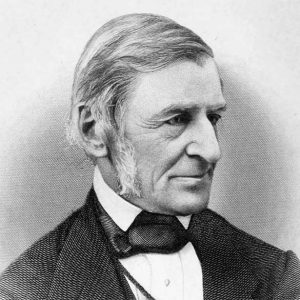Author: Thomas W. Howard, Bilkent University
Note: This blog series is a companion to the panel “The End(s) of Originality?: The Transcendentalists and AI” at the 2024 C19: The Society of Nineteenth-Century Americanists conference in Pasadena, California.
When I first came up with the idea of a blog series on Emerson and AI in the spring of 2023, ChatGPT was still a quirky novelty. Sure, there were already op-eds prophesying the end of creative work, but most people were still only discovering what the possibilities of the technology might be. Now—in December 2023—ChatGPT and its ever-expanding list of competitors like QuillBot, ChatSonic, and Google’s Bard are a staple of the online experience. Learning how to leverage this technology effectively—while avoiding its inherent dangers—will be a constant task for our and each successive generation.
This blog series brings together six different attempts to begin considering the implications of this technology from an Emersonian perspective. Turning to essays like “Circles,” “The Over-Soul,” and “Quotation and Originality,” these authors consider not only what Emerson might have thought about generative AI, but also how we ought to approach it from a self-reliant and transcendentalist perspective.
Marc Martorana acknowledges that we have had a complex technological landscape for a while now, with social media algorithms affecting our daily experience more than we might realize. He notes that Emerson advocates for a “commitment to self-cultivation” that will, hopefully, help “our young people face an increasingly complex technological landscape.” Carolina Maciel uses the rise of AI to turn to the past, considering how we have always been “tools of [our] tools.” She also suggests that we should protect against the integrated biases that appear in our technology. And Emmy Brown points to Louisa May Alcott’s personal writings about the “plagiarism” of Little Women to show how authors are always reworking others’ ideas. Perhaps, Brown suggests, the tools of generative AI could still “inspire masterpieces.”
On the cautionary side, Jim Rittenhouse asks about the “higher origin” or “Over-Soul” of the machine: is it the original programming, or the human programmer? Will materialist generative AI ever become idealist? Bill Younglove warns that generative AI could lead to the usurpation of our original ideas, especially those ideas that make us “most human—choice and originality.” Younglove’s warning resonates with recent studies on ChatGPT’s plagiarism and other concerns with intellectual property in an age of generative AI. Finally, Frank Hall warns that “AI only represents or mimics what humans creatively originate by their self-identity.” Pointing to Emersonian and Shakespearean poetry, Hall shows how AI cannot reproduce the creative impulse that these poets did.
Or at least, AI cannot yet reproduce these poems. The yet necessarily hangs over all these essays since we are so early in what generative AI will eventually become. This blog series risks the same feeling as the (fictitious) Martin Van Buren letter on the ungodly “breakneck speed” of railroads. Generative AI is a fact of our world now, and to shun it completely risks falling behind those who take advantage of the features it offers. But as these essays show, we ought to remain cautious and think critically about how we are affected by “our tools.”
Originally, I planned to end the introduction there, but while collecting and editing these essays, I happened to be also grading my students’ midterm essays. Naturally, I had some concerns about AI plagiarism, and I needed to meet with a few students to see how they used such online resources. Expecting overt cheating, I was surprised. Students weren’t simply asking ChatGPT to write their papers; rather, they were using the technology to improve their writing. Here in Türkiye, I teach in an English-language university where most students are interacting in their second language, so they turn to AI programs for grammar and translation help. Some students will write their own essay, copy it into ChatGPT, and ask for suggestions for improvement. Having since tried this on my own writing, I can attest that the advice is hit-or-miss, but what this all suggests is a realm of the ethical use of generative AI for written assignments without simply asking ChatGPT to “Write a 1,000-word essay on sexism in The Iliad.”
So as we continue to consider the future of generative AI, especially in educational contexts, we should remember the possibilities as well as the risks. For example, what if we train a GPT on Emerson’s corpus and allow students to ask it questions? What if each class had an AI model that could grow and learn with each new semester of students, bridging information and discoveries from one class to the next? What if writing assignments could teach the ethical use of generative AI alongside the course content? And what if AI could somehow help us assess our students’ learning? I guarantee that any student would gladly give up the standard “write a discussion board post and respond to two others” online assignment for something more interactive using generative AI. These essays are just the first step in considering the possibilities and the warnings of generative AI use from an Emersonian perspective. Please also join us at the panel, “The End(s) of Originality?: The Transcendentalists and AI,” at C19 in Pasadena for a continued conversation on this timely topic.
